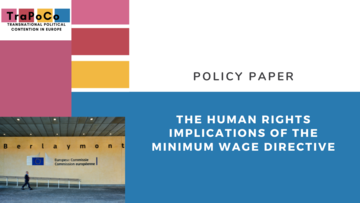The Human Rights Implications of the Minimum Wage Directive
It might be surprising that an EU directive on ‘adequate minimum wages’ in the European Union’ (the ‘Minimum Wage Directive’) would be contested or would be an important site for struggles over the vision of human rights that should animate European law and policy, but that is the case. In this paper, we explore the theoretical and political contestations that informed the important developments in language and substance between the directive proposed by the European Commission in October, 2020, 2 and the final Directive (EU) 2022/2041 of 19 October 2022 on adequate minimum wages. 3 We argue that the normative imperatives of the directive’s relationship to human rights, specifically social and economic rights and the ‘solidarity rights’ related to trade unions, along with the competing interests and the variation between member state labour systems that characterise European labour politics on this issue, led to the particular form contestation took in this case and the prospects the agreement opens up for future labour politics in the European space.
We further argue that the tensions between the alleged absence of EU competence in this area show the need for a robust statement of human rights that emphasises workers’ agency and collective action and not just the passive entitlement to a decent standard of living.
By: Graham Finlay and Roland Erne, University College Dublin
Language: English


